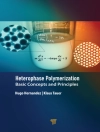The conventional solvents used in chemical, pharmaceutical, biomedical and separation processes represent a great challenge to green chemistry because of their toxicity and flammability. Since the beginning of “the 12 Principles of Green Chemistry” in 1998, a general effort has been made to replace conventional solvents with environmentally benign substitutes. Water has been the most popular choice so far, followed by ionic liquids, surfactant, supercritical fluids, fluorous solvents, liquid polymers, bio-solvents and switchable solvent systems.
Green Solvents Volume I and II provides a throughout overview of the different types of solvents and discusses their extensive applications in fields such as extraction, organic synthesis, biocatalytic processes, production of fine chemicals, removal of hydrogen sulphide, biochemical transformations, composite material, energy storage devices and polymers. These volumes are written by leading international experts and cover all possible aspects of green solvents’ properties and applications available in today’s literature.
Green Solvents Volume I and II is an invaluable guide to scientists, R&D industrial specialists, researchers, upper-level undergraduates and graduate students, Ph.D. scholars, college and university professors working in the field of chemistry and biochemistry.
Table of Content
Green Solvents Fundamental and Industrial Applications.- Green Fluids Extraction and Purification of Bioactive Compounds from Natural Materials.- Green Solvents for Biocatalysis.- Green Solvents for Pharmaceutical Industry.- Limonene as Green Solvent for Extraction of Natural Products.- Glycerol as an Alternative Solvent for Organic Reactions.- Water as Reaction Medium in the Synthetic Processes Involving Epoxides.- Ionanofluids– New Heat Transfer Fluids for Green Processes Development.- Green Solvents for Polymerisation of Methyl Methacrylate to Poly(Methyl Methacrylate).- Use of Fatty Acids to Develop Green Polymers and Composites.- Green solvents in Thin Layer Chromatography.- Application of Dimethyl Carbonate as Solvent and Reagent.- Application of Supercritical Fluids for Biodiesel Production.- Nanofluids as advanced coolants.












